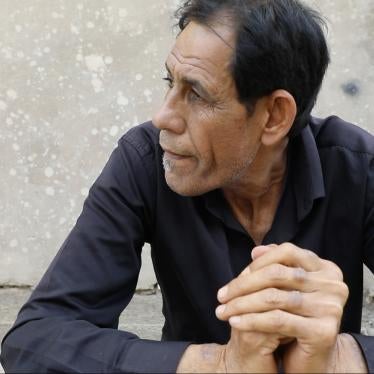It’s been more than two years since the five men accused of plotting the 9/11 attacks were arraigned before military commissions at Guantanamo Bay, Cuba, and still the case is not even close to trial, stymied by novel and often bizarre issues unlikely to come up in federal court. One such issue was on the docket at a pre-trial hearing at Guantanamo yesterday: Did the fact that the Federal Bureau of Investigation (FBI) secretly questioned and enlisted the help of defense team members create a conflict of interest so detrimental to the defense that they can no longer represent their clients?
The issue arose after defense lawyers discovered in April that the FBI had secretly interviewed a security expert on co-defendant Ramzi bin al Shibh’s defense team and had him sign a non-disclosure agreement. Defense lawyers have since learned that others on several of the five defense teams (one for each co-defendant) were also questioned, and suspect that at least one might have even been an informant for the FBI. The conflict of interest would arise from the fact that the entity investigating the defense team (the FBI) is part of the US government, as, of course, is the prosecution in the case.
Why the FBI was investigating members of the defense team in the first place is not entirely clear, though arguments yesterday suggested the investigation may have been for alleged violations of rules about the voluminous amount of classified material in the case. A Justice Department team looking into the FBI questioning, led by Assistant US Attorney Fernando Campoamor-Sanchez, filed submissions with the court. But those submissions, like so much else related to the military commissions, remain secret; not even the defense lawyers have access to them.
Yesterday, Campoamor-Sanchez said the FBI investigations were closed last month without charges and therefore there was no longer any legal basis for considering whether a conflict exists. Defense attorneys argued that the FBI investigations have seriously undermined client trust in their ability to protect attorney-client information crucial to their defense. The judge, Army Col. James Pohl, has reserved decision on the matter. If he decides to delay the case further, it would not be the first time. He did so several times previously to consider the implications of: the discovery of listening devices disguised as smoke detectors in attorney-client meeting rooms; CIA monitoring of the court room; the disappearance of large volumes of both defense and prosecution files from military commission servers; and the accumulation of piles of rat feces and mold in defense attorney office space at Guantanamo.
It is painful to watch these commissions grapple, at tremendous expense, with so many issues that would never arise in federal court. It costs the government $90,000 just to fly defense attorneys, prosecutors, court staff, journalists and observers to and from Guantanamo for each hearing. But finances aside, the ongoing delay of justice in what may be the most important terrorism case in US history, and the dangerous precedent that allowing a second-rate system of justice in these cases has set, create even deeper costs that will take a long time for the country to overcome.








